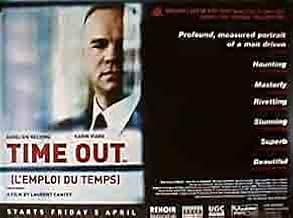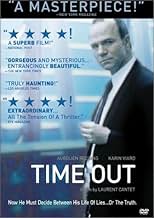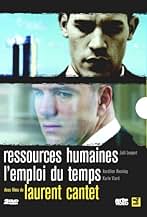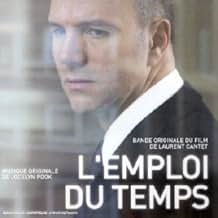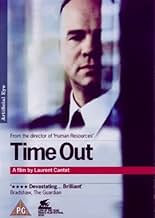VALUTAZIONE IMDb
7,3/10
5101
LA TUA VALUTAZIONE
Aggiungi una trama nella tua linguaAn unemployed man finds his life sinking more and more into trouble as he hides his situation from his family and friends.An unemployed man finds his life sinking more and more into trouble as he hides his situation from his family and friends.An unemployed man finds his life sinking more and more into trouble as he hides his situation from his family and friends.
- Premi
- 3 vittorie e 8 candidature
Trama
Lo sapevi?
- QuizInspired by a true story, that of Jean-Claude Romand. In reality, Romand went on to kill, on January 9, 1993, his wife, two children and both his parents. It is the first of three films in two years inspired by the case, followed by L'avversario (2002) and Nobody's life (2002), of which the former is the closest to the real events. Phantom (2002) was also inspired by the same incident.
- ConnessioniFeatured in The 2003 IFP Independent Spirit Awards (2003)
- Colonne sonoreL'Emploi Du Temps - Musique Originale
Composed by/ Arranged By Jocelyn Pook
Performed by 'Electra Strings' Ensemble
Cello Solo performed by Sophie Harris
Viola Solo performed by Clive Howard
Violin solo performed by Jacqueline Norrie
Phonographic Copyright (p) Jocelyn Pook / Haut et Court
Under Exclusive License To Virgin France
Published By Chester Music Ltd.
© 2001 Virgin France
Recensione in evidenza
Has anybody ever set up a truck stop shot more magnificently?
This film is the full ten thing. Cast is spectacular, the photography superb, the unobtrusive music on the money, the story and its effects on the life of a family, affecting. Subtlety is a hallmark here. If you don't know the story line it must be even more powerful in a first viewing. As Fellini made at least two films that can be seen as defining the male of the Catholic/Italian species (8 1/2 & Amarcord) this magnificent film from France from a director I am not familiar with, defines "the problem of being male." I was fully involved and unable to complete a sentence for twenty minutes after the lights went up. But it is just not male identification at work here. It is the anguish and plight of the wife, magnificently played by Karen Viard, or the children who are as confused and anxious as any of us. The father, a very French man with a franc or euro, even redeems himself with love and compassion. And the "unsavory" seller of bogus goods who rescues our Vincent by offering employment, comes through swimmingly with compassion and understanding. I can not recommend this film enough. Please see it.
This film is the full ten thing. Cast is spectacular, the photography superb, the unobtrusive music on the money, the story and its effects on the life of a family, affecting. Subtlety is a hallmark here. If you don't know the story line it must be even more powerful in a first viewing. As Fellini made at least two films that can be seen as defining the male of the Catholic/Italian species (8 1/2 & Amarcord) this magnificent film from France from a director I am not familiar with, defines "the problem of being male." I was fully involved and unable to complete a sentence for twenty minutes after the lights went up. But it is just not male identification at work here. It is the anguish and plight of the wife, magnificently played by Karen Viard, or the children who are as confused and anxious as any of us. The father, a very French man with a franc or euro, even redeems himself with love and compassion. And the "unsavory" seller of bogus goods who rescues our Vincent by offering employment, comes through swimmingly with compassion and understanding. I can not recommend this film enough. Please see it.
I più visti
Accedi per valutare e creare un elenco di titoli salvati per ottenere consigli personalizzati
- How long is Time Out?Powered by Alexa
Dettagli
Botteghino
- Lordo Stati Uniti e Canada
- 448.542 USD
- Lordo in tutto il mondo
- 1.213.913 USD
- Tempo di esecuzione2 ore 14 minuti
- Colore
- Mix di suoni
- Proporzioni
- 1.85 : 1
Contribuisci a questa pagina
Suggerisci una modifica o aggiungi i contenuti mancanti

Divario superiore
By what name was A tempo pieno (2001) officially released in India in English?
Rispondi



